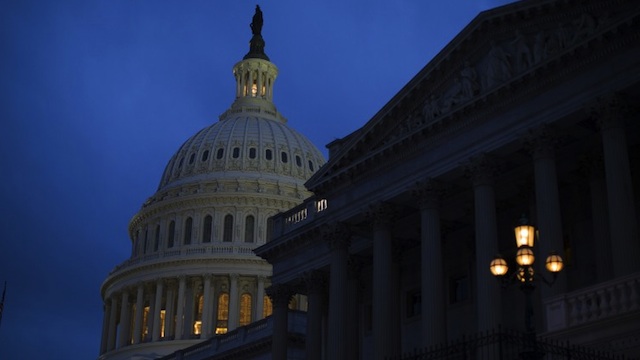SUMMARY
This is AI generated summarization, which may have errors. For context, always refer to the full article.

WASHINGTON DC, USA – Republicans Tuesday, January 1, stood on the brink of a vote to kill a deal to avert a US “fiscal cliff” budget calamity, a move that threatened shock waves in global markets and for the fragile US economy.
The deal to cut newly-raised taxes on most Americans and to make the rich pay the highest tax rates since Bill Clinton’s 1990s presidency, passed the Senate in a dramatic moment of political theater two hours into 2013.
But hopes of a timely vote in the House of Representatives on Tuesday to nudge the deal into law were dashed as Republicans complained it did not include spending cuts to social programs that swell the deficit.
Some Republicans demanded in tense meetings with their leaders for the House to amend the Senate deal and send it back, a move that would be likely to effectively neutralize its chances of becoming law.
That would be a risky move as it could enrage voters as all Americans face new tax hikes that came into force at midnight and would also trigger $109 billion in automatic spending cuts that could cause a recession.
After a day of brinkmanship, House leaders came up with a two-pronged plan to navigate the often confusing ways of the US Congress, that could either see the Senate deal amended and squelched or could rescue it.
The plan would first see Republican leaders whip their caucus to see if there is a 217vote majority to pass and amend the Senate bill with additional spending cuts.
If it passes it would go back to the Senate, where some Democratic aides were already vowing to block the amended version.
Should it fail, Republican House Speaker John Boehner would bring up the original Senate bill which stands a good chance of passing as President Barack Obama’s Democrats would likely join some Republicans for a majority.
“There’s a growing sense that, you know… you do have to know when to hold them and when to fold them. We’ve been beaten in this fight,” retiring Ohio Republican Congressman Steve LaTourette told CNN.
A failure to pass the Senate bill was likely to provoke turmoil in global markets and a prolongation of the so-called “fiscal cliff” crisis is projected by economists to tip the slowly recovering US economy back into recession.
Earlier, Boehner’s coalition vented fury that the deal negotiated by the White House and top Senate Republicans had not contained spending cuts.
“We have to in some way address spending,” Republican congressman Spencer Bachus said, confessing he would be “shocked” if the bill was not amended in the House to add spending cuts before being being sent back to the Senate.
One House Republican, Tim Huelskamp, said that the powerful number two Republican in the chamber Eric Cantor told a high stakes meeting of the party caucus that he was opposed to the bill.
“The principal reason is there are no spending cuts,” said Huelskamp.
As the year turned, every American became liable to a tax hike with the expiry of rate cuts first passed under former president George W. Bush.
Huge spending cuts also were also kicking in across the US government in a combined $500 billion whack that experts fear could send the fragile economy tipping back into a job-killing recession.
The deal to avert the fiscal cliff agreed on Monday raised taxes only on households earning $450,000 a year and exempted anyone else.
It put off the spending cuts known as the sequester for two months, setting up another bitter political cliffhanger at the end of February.
If the legislation does pass the House unamended, it will represent a win for Obama as it raises taxes on the richest Americans in line with a reelection campaign promise albeit above an income threshold higher than he and other Democrats had wanted.
Obama issued a statement shortly after the 2:00 am (0700 GMT) Senate vote, urging House lawmakers to pass the bill “without delay.”
The White House said the tax agreement was “a victory for middle-class families and the economy,” and laid out the raft of measures contained in the legislation.
“For the first time in 20 years, Congress will have acted on a bipartisan basis to vote for significant new revenue,” it said.
The deal also includes an end to a temporary two percent cut to payroll taxes for Social Security retirement savings meaning all Americans will pay a little more and changes to inheritance and investment taxes. – Rappler.com
Add a comment
How does this make you feel?





There are no comments yet. Add your comment to start the conversation.